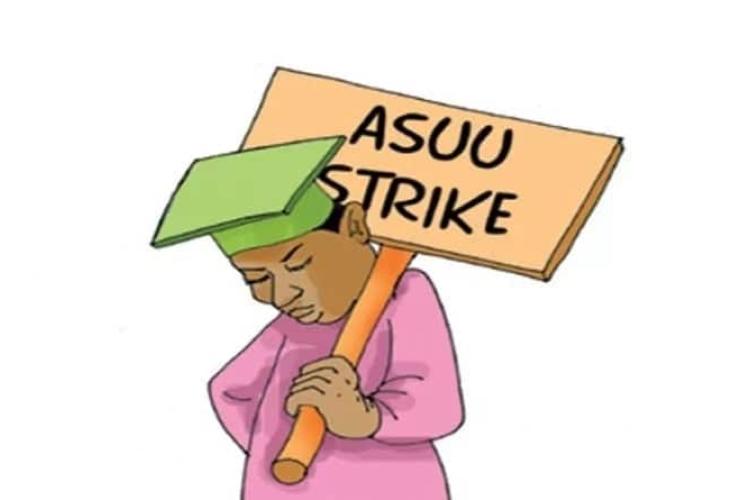The ongoing strike by the Academic Staff Union of Universities (ASUU), which started on February 14, 2022, is now the second longest strike since the return to democracy in 1999.
Even as it drags on bringing untold hardships and frustrations to parents, lecturers and students, government claims to be doing its best, and it’s self-evident their best is simply not good enough. Any deep investigation and thorough analysis of ASUU’s grievances and government’s defence will reveal that government, not ASUU, bears responsibility for the virtual collapse of the public university system. It’s pertinent to note that at no time has any government spokesperson claimed that public universities infrastructure, syllabus and remunerations of academics are of befitting standard. Rather they acknowledge the decline of public universities but lament that there is no money to uplift the system or attend to ASUU’s demands. Such excuses are not tenable because government has money to do whatever it wants; it is simply a matter of priorities.
One of ASUU’s main demands is the implementation of a 2009 agreement. If the money is not available then it begs the question; were funds ever budgeted to honour the agreement? If so then what happened to the money? If not, then it lends credence to accusations that government is not trustworthy routinely entering into agreements with labour unions which they have no intention of honouring. Indeed this administration has shown that its priorities lie elsewhere. The very notion that spending hundreds of billions on unverifiable cash handouts, constructing railway lines to foreign countries while donating cash and luxury vehicles to them, and international gallivanting are more important for national development than an excellent educational system reveals a serious deficiency of intellect in political leadership.
The unpalatable truth is that Nigerian political office holders, from the president downwards, all paid with public funds and ultimately charged with upholding standards of education, have abandoned the Nigerian university system and sent their children overseas. The social media is replete with photographs in which they beam with pride while celebrating their children’s graduation from overseas universities. As parents, they cannot be condemned for wanting the best for their children; the only reproach is that they are paid to preside over Nigerian public universities whose common traits are outdated syllabus, neglect of facilities and poor remuneration of staff. Public universities are being destroyed in the similar manner as government primary and secondary schools.
Education is the key to national development and neglect of the sector, coupled with ongoing massive corruption, is the main reason Nigeria is regressing with respect to other nations who were once in far worse off circumstances.
The abhorrent situation is a conundrum in which an irresistible force for progress represented by ASUU’s demand for undisputed urgently required improvements in the nation’s public university system, has come across the immovable object of government’s acceptance of the problem, but stubborn refusal to do anything about it. This is tragic because considering the pivotal role of quality education in national development, the highest premium is supposed to be placed on the highest quality education for all Nigerians.
Seemingly bereft of ideas to solve given the unique challenges facing the nation, government spokespersons have resorted to emotional blackmail by telling parents that ASUU is to blame for not looking after the interests of their children. ASUU is not a student union; its job is to look after the interest of its members in terms of remuneration and working conditions. It is the government’s job to look after students’ interests which they have palpably failed to do. It is an undeniable truth that the levels of integrity, intellect and academic qualification within ASUU dwarf those within the legislature and executive who are entrusted with the duty of developing the educational sector. ASUU represents the nation’s intelligentsia; comprising professors and doctorate degree holders who earned verified qualifications from reputable institutions, whereas the executive and legislature are notorious for “honourable” members with suspect WAEC, degree, and higher degree qualifications which would never qualify them for ASUU membership let alone leadership!
The Senate quite absurdly advertised its superficial thought processes by passing a bill establishing federal universities of medical sciences in each of the nation’s six geo-political zones. This is in spite of the fact that government has neither the funds nor the commitment to properly operate the existing 106 state and federal universities and is borrowing to pay salaries! It is nothing short of shameful that the National Assembly has turned establishing tertiary institutions into political projects. It is evident that government is clueless as to how to resolve the ASUU issue.
Being far more intelligent and compassionate than those in government who have shown little aptitude in national development, ASUU leadership should apply the concept of “constrained optimisation”. In unacademic terms, this simply means making the best of any situation given its limitations. ASUU must accept that the closure of public universities while their members suffer untold financial hardship is not the best that can happen in this situation. They should not regard calling off the strike as a “defeat”, but more of acceptance of the evident abhorrent lack of concern the outgoing administration exhibits for improving the educational system. If, however, ASUU insists on continuing its strike and causing more suffering by banging their heads against a brick wall of unintelligent governance, then surely it begs the question: “just how intelligent is our intelligentsia?”

 Join Daily Trust WhatsApp Community For Quick Access To News and Happenings Around You.
Join Daily Trust WhatsApp Community For Quick Access To News and Happenings Around You.

